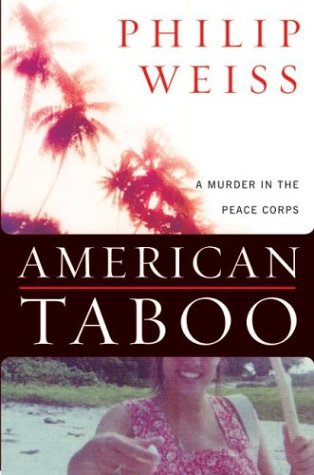June 21, 2004: Headlines: COS - Tonga: Crime: Murder: Safety and Security of Volunteers: New York Times: In the Peace Corps, Evil Lurked Along With Noble Intentions and Good Works
Peace Corps Online:
Directory:
Tonga:
Special Report: 'American Taboo: A Murder in the Peace Corps':
June 21, 2004: Headlines: COS - Tonga: Crime: Murder: Safety and Security of Volunteers: New York Times: In the Peace Corps, Evil Lurked Along With Noble Intentions and Good Works
American Taboo: A Murder in the Peace Corps
 | Charges possible in 1976 PCV slaying
Congressman Norm Dicks has asked the U.S. attorney in Seattle to consider pursuing charges against Dennis Priven, the man accused of killing Peace Corps Volunteer Deborah Gardner on the South Pacific island of Tonga 28 years ago. Background on this story here and here. |
 | American Taboo
Read the story of Volunteer Deborah Gardner's murder in Tonga in 1976 and how her killer has been free for the past 28 years with the help of the Peace Corps. Read an excerpt from Philip Weiss' book documenting the murder and coverup. Then read an essay by RPCV Bob Shaconis who says that Peace Corps' treatment as a "sacred cow" has exempted it from public scrutiny and that the agency has labored to preserve its shining reputation, sometimes at the expense of the very principles it is supposed to embody. |
In the Peace Corps, Evil Lurked Along With Noble Intentions and Good Works

In the Peace Corps, Evil Lurked Along With Noble Intentions and Good Works
In the Peace Corps, Evil Lurked Along With Noble Intentions and Good Works
By JANET MASLIN
Published: June 21, 2004
The place: Manhattan. The year: 2002. The setting: a coffee bar in SoHo. The meeting: long-awaited. Philip Weiss has been working up to it for years. Readers of his "American Taboo" have been waiting for 340 pages that only feel like years.
Mr. Weiss is there to confront Dennis Priven, who was once a Peace Corps volunteer in the South Pacific island kingdom of Tonga. "American Taboo" has assembled considerable evidence that Mr. Priven murdered one of his fellow volunteers and got away with it. In preparation for this showdown, Mr. Weiss has hired a private investigator who wrote a book called "Your Secrets Are My Business." The investigator has taught Mr. Weiss how to wear a baseball hat and to practice following people around.
When the two men finally have their encounter, readers learn how Mr. Priven helps Mr. Weiss adjust the zipper on his knapsack. There is talk about whether this conversation will be off the record. Mr. Priven says he doesn't want to discuss the case until 2007. One of them drinks juice; the other has lemonade. And nothing else happens.
"He didn't look back, I'm sure of that," Mr. Weiss writes. "But then neither did I."
In a real work of investigative journalism, this might qualify as a whopping anticlimax. But in "American Taboo," it's just more of the same. The whole book is padded with repetitions, nonevents, paragraphs full of sawdust, marginal details, purplish flights of fancy and not-too-quotable quotes. To the extent that he has happened upon a never-told story of sex, scandal and cover-up, Mr. Weiss has done a remarkable job of sapping the life out of it.
Part of the problem lies with the book's iffy provenance. It came about because Mr. Weiss, no Tongan himself, with no ties to anyone involved, got wind of this decades-old killing and decided to investigate and imagine all its details. So as "the smell of ripening guavas filled the air," and the murder of Deborah Gardner looms closer, Mr. Weiss pictures her dancing. He does it with characteristic overkill: "Her mouth was open in laughter, her cheeks were dark with color, and thick strings of hair slapped around her face, slicked by saliva, sweat, life juice." Life juice? "American Taboo" would have been a much better book if it weren't drippy with the stuff.
"Why did you feel that you should write a book about something for which my family never sought any attention?" Ms. Gardner's brother quite reasonably asks Mr. Weiss. Well, the answer has something to do with how attractive Ms. Gardner looks in old photographs. Then there are justice unserved, journalistic integrity to uphold and the apparent hot-stuff marketability of this material.
"Do you want me to give you a letter from my publisher?" Mr. Weiss asks when he tries to persuade participants to talk to him. (Many refuse.) He often refers to Deborah Gardner's story as a legend, mostly because other written accounts (including a roman à clef by a fellow Peace Corps worker) have found no takers. They provide some of the life juice that is recycled here.
The story of the crime is so simple that it appeared in a recent magazine excerpt, compressed to a few pages without the loss of anything important. Among the Peace Corps volunteers who landed in Tonga in 1975, quite a few had crushes on Ms. Gardner. She was a free spirit, as recalled by many anecdotes of varying interest.
One admirer remembers the sight of her squeezing a pimple. "No chick had ever done that right in front of him," Mr. Weiss writes. "But Deb didn't care." Another admirer remembers thinking: "Boy, is that Debbie Gardner gorgeous, and why is it that the lives of the beautiful are so often tragic?"
Ms. Gardner flirted freely enough to rattle Mr. Priven, a Peace Corps worker teaching math to Tongans. (The book includes sine-cosine mnemonics for trigonometry formulas, because no detail is too small.) He scared the others by painting a diabolical image on his door. He was said to smell like a bat (a very bad thing by Tongan standards — consider what happens to the excrement of a creature that sleeps upside-down). And he was seen grappling violently with Ms. Gardner on the night she was stabbed many times, as eyewitnesses would later testify at his Tongan trial.
"Who did this to you?" the dying Ms. Gardner was asked.
"Dennis," she answered.
The book includes pages of nonelectrifying courtroom transcript to establish how Mr. Priven was convicted. Then, at long last, the interesting part of this story arrives. The Peace Corps closed ranks and disavowed its longstanding policy to make volunteers live by the laws of the countries they visited. An American cover-up ensued, and Mr. Priven was allowed to go back to Brooklyn and escape punishment. The book illustrates how protecting the image of the Peace Corps became more important than the fate of this one man.
The moral indignation of "American Taboo" is accompanied by a comma-happy, affected primitivism that takes the form of frequent run-on sentences. ("Deb dressed modestly, in denim skirts and men's button-down shirts, still men noticed her big laugh and the way her body moved.") Such syntax is one more indication that Mr. Weiss would have fared better with a forthright, baloney-free true-crime story rather than one that even regales the reader with the killing of a 1,200-pound moose. Why the moose? Because Ms. Gardner's estranged father was hunting in Alaska when he learned of his daughter's death.
"I broke my daughter's heart," Mr. Weiss writes with artificial intimacy, seeming to inhabit the mind of this man. Then Mr. Weiss simply repeats the word nothing 11 times to express guilt over Mr. Gardner's lack of closeness to his daughter. In the process, "American Taboo" itself earns another nothing or two.

Some postings on Peace Corps Online are provided to the individual members of this group without permission of the copyright owner for the non-profit purposes of criticism, comment, education, scholarship, and research under the "Fair Use" provisions of U.S. Government copyright laws and they may not be distributed further without permission of the copyright owner. Peace Corps Online does not vouch for the accuracy of the content of the postings, which is the sole responsibility of the copyright holder.
Story Source: New York Times
This story has been posted in the following forums: : Headlines; COS - Tonga; Crime; Murder; Safety and Security of Volunteers
PCOL12003
13
.



